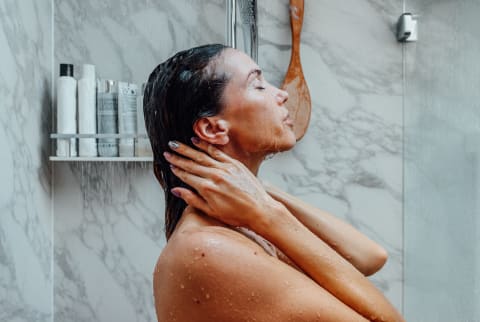Advertisement
Do You Have Hard Water? Here's How To Tell & Adjust Your Routine


Most of the shower-time conversation tends to focus on length (are you staying in until your fingertips are pruned?) and water temperature (are you stepping under a scalding spray?). But let's take a deeper dive into the droplets themselves: Are you showering in hard or soft water?
For some, the type of water can tip the scale between supple and dry, irritated skin. But how do you know which type of water you have? Here's how to tell what's coming out of the tap and what to do about it.
How to tell if you're showering in hard water.
Hard water is basically water that contains a high amount of minerals, namely calcium and magnesium. Those minerals can change your skin's pH balance, which can then affect your skin microbiome (remember: Our skin microbiome prefers a slightly acidic pH of about five). "Hard water tends to make skin drier and more sensitive," says board-certified dermatologist Loretta Ciraldo, M.D., FAAD, especially if your skin barrier is already compromised (which, alas, is more common during winter).
However, assessing your skin shouldn't be the only way to tell if you have hard water; dry, itchy skin can stem from a range of concerns, after all, and it doesn't always shed light on the shower. That said, Ciraldo shares a simple, at-home test:
- Fill a bottle about ⅓ full with your tap water.
- Add a few drops of liquid soap and shake vigorously.
- If the water looks cloudy with not much foaming, you likely have hard water.
Have hard water? Here's what to do about it.
If you're living in an area with hard water, don't panic. Hard water isn't inherently bad1, unless you notice any of the aforementioned skin concerns. Take it from Ciraldo: "Many people who have hard water don't need to do anything," she notes. If your skin can tolerate it, there's no need to sound the alarm. But if you are facing some dryness or irritation, here are a few to-do's:
Moisturize immediately after.
Applying moisturizer after every rinse is crucial for locking in that water (board-certified dermatologist Whitney Bowe, M.D., recommends waiting no longer than two minutes to slather on), but if the water itself is drying you out? It's even more important to butter up your skin barrier.
Just make sure your cream or lotion includes a nice blend of humectants, emollients, and occlusives to effectively draw in water, soften rough areas, and make sure all that hydration stays locked inside. If you're looking for a few ingredient MVPs, you can never go wrong with aloe, shea butter, moringa seed oil, and colloidal oat.
The latter is a particularly hydrating superstar, in fact, and Ciraldo says it's especially great for hard water woes: "If you live in an area of hard water, you should consider using an oatmeal body wash or lotion," she previously tells mbg about the ingredient, as colloidal oat has been shown to soothe skin irritation and protect the skin barrier2. Oat oil—the lipid component of colloidal oatmeal—contains a remarkably high amount of linoleic acid, which means you're getting the most out of the plant's fatty acid content. Find a body lotion infused with oat oil (like our richly hydrating number), and your skin will feel instantly soothed and supple, regardless of the type of water you have.
Rethink your shower habits.
For some, scaling back the shower schedule can keep the skin feeling smooth. Can you limit your rinses to once a day? We're certainly not telling you to forgo a wash after a sweaty workout, but if your lifestyle allows it, perhaps give it a go and see if any dryness or itch subsides. After all, the less exposure you have to that hard water, the less it will dry out your skin. As for when exactly to hop under the spray, derms declare an evening rinse is best for skin.
Invest in a water softener.
Finally, certain tools can also remove certain minerals from the tap. According to Ciraldo, a water softener can be incredibly effective if you've exhausted all other options: "[They] exchange calcium and other sensitizing minerals for sodium, which makes the water soft again," she says. It's not totally necessary to install (there are other, more cost-friendly things to try first), but it does approach the problem head-on. Here's a high-tech showerhead and filter from Amazon, if you're in the market.
The takeaway.
Hard water can be drying on the skin, so if you're facing some scaliness that won't seem to let up, it might be time to take a look at the tap itself. It's nothing to worry about too much if your skin can handle it—but for some, approaching the water can change the game.
